10 "SuperFoods" That Boost Your Brainpower and Productivity Naturally...
Superfood Meaning: a nutrient-rich food considered especially beneficial for health and well-being.
In a world where focus, memory, and mental clarity are essential to achieving success, have you ever wondered how to give your brain the fuel it needs to perform at its best? You and I both know how frustrating it can be to feel foggy, distracted, or sluggish. But here’s the truth: your brain is a powerhouse, and the food you eat directly affects how well it works.
In this guide, we’ll explore 10 incredible brain-boosting foods that not only sharpen your focus but also enhance your productivity. Imagine waking up every morning with a clear mind, razor-sharp focus, and the ability to tackle your tasks with ease. That’s what these foods can do for you.
Let’s dive into how you can power up your brain and boost your productivity—starting today.
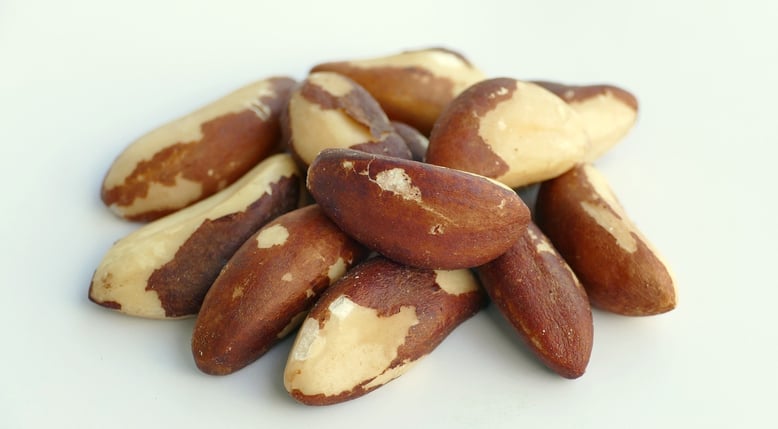

1. Blueberries – The Brain Berry
Why They Work
Blueberries are often called “nature’s brain booster” because they’re packed with antioxidants, specifically flavonoids, which improve memory, delay brain aging, and protect brain cells from damage. Studies show that regular consumption of blueberries enhances communication between brain cells and even boosts problem-solving skills.
How to Use
Add a handful of fresh or frozen blueberries to your morning smoothie.
Sprinkle them over oatmeal, yogurt, or salads for a burst of flavor and nutrients.
Fun Fact
A study published in The Annals of Neurology found that eating blueberries can delay cognitive aging by up to 2.5 years. So don't delay Yourself.
💡 Take Action Now! Keep a pack of organic blueberries in your fridge today. Grab them [here].
Scientific Deep Dive
Anthocyanins in blueberries cross the blood-brain barrier, improving neuronal signaling and protecting against oxidative stress.
Study: A 2010 study in The Journal of Agricultural and Food Chemistry showed that regular blueberry consumption enhances spatial memory and task performance in older adults.
How It Works: Anthocyanins fight free radicals in the brain, reducing inflammation and oxidative stress, both of which are linked to cognitive decline.
Extra Proven Method
Make a blueberry brain shot: Blend blueberries with flaxseeds (also brain-boosting) for an antioxidant-packed drink.


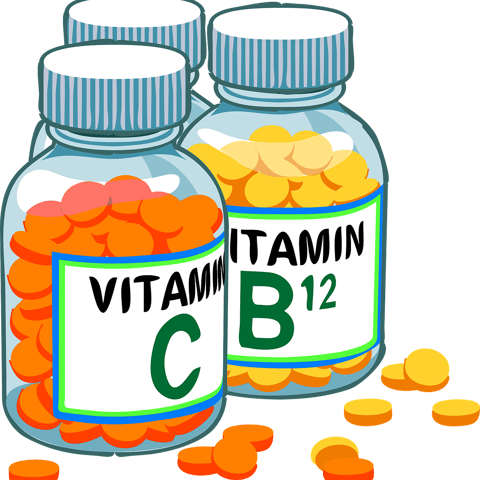

2. Fatty Fish – Omega-3 for a Smarter Brain
Why They Work
Fatty fish, like salmon, mackerel, and sardines, are loaded with Omega-3 fatty acids, which are essential for building brain cell membranes. These healthy fats enhance learning, memory, and mental clarity. Omega-3s also reduce brain inflammation, improving mood and reducing the risk of mental decline.
How to Use
Grill or bake salmon for a protein-rich brain-boosting meal.
Add sardines or mackerel to salads or sandwiches.
Don’t like fish? Try an Omega-3 supplement instead.
Fun Fact
The brain is about 60% fat, and Omega-3s are vital for maintaining its structure and performance.
Action
🧠 Boost Your Brain Today! Don’t miss out on the benefits of Omega-3s—check out the best-quality fish oil supplements.
Scientific Deep Dive
Omega-3 fatty acids, particularly DHA (Docosahexaenoic Acid), are essential for maintaining the structural integrity of neurons.
Study: A 2016 study published in Neurology linked higher DHA levels to improved cognitive function and a reduced risk of Alzheimer’s disease.
How It Works: Omega-3s support synaptic plasticity, which is crucial for learning and memory.
Extra Proven Method
Pair fatty fish with turmeric: Curcumin in turmeric enhances the absorption of Omega-3s, amplifying its brain-boosting benefits.
3. Dark Chocolate – Your Brain’s Sweet Ally
Why It Works
Dark chocolate isn’t just delicious—it’s loaded with flavonoids, caffeine, and antioxidants that improve brain function. The flavonoids in dark chocolate increase blood flow to the brain, which enhances focus, memory, and reaction time.
How to Use
Snack on a small square (70% cocoa or higher) for a mid-afternoon productivity boost.
Add grated dark chocolate to smoothies or yogurt.
Fun Fact
Research published in Nature Neuroscience found that flavonoids in dark chocolate can even reverse age-related memory loss.
Action:
🍫 Indulge Your Brain! Treat yourself to premium dark chocolate and power up your productivity. Get your stash [here].
Scientific Deep Dive
Flavonoids in dark chocolate stimulate the production of brain-derived neurotrophic factor (BDNF), which supports the growth of new neurons.
Study: A 2018 study in Frontiers in Nutrition confirmed that dark chocolate improves cognitive performance, particularly in tasks involving memory and focus.
Extra Proven Method
Make a focus-enhancing hot chocolate: Use 70% dark chocolate, add a pinch of cinnamon, and mix with almond milk
(Don't buy, make your own via Youtube videos) for a healthy, brain-boosting drink.
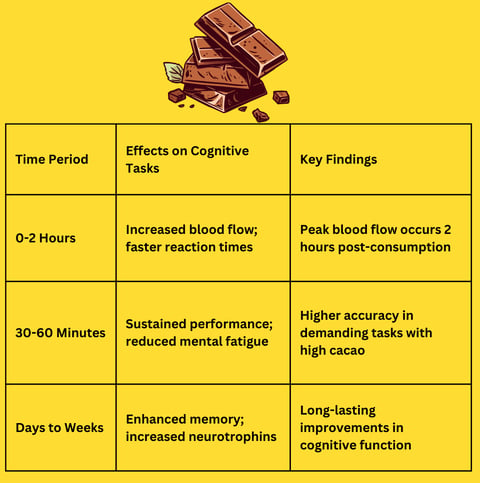

4. Nuts – The Brain’s Snack
Why They Work
Nuts, particularly walnuts and almonds, are rich in vitamin E, healthy fats, and antioxidants. Vitamin E protects the brain from oxidative stress and cognitive decline, while the fats in nuts help maintain brain cell health.
How to Use
Grab a handful of walnuts or almonds as an on-the-go snack.
Add chopped nuts to your salads, oatmeal, or baked goods.
Fun Fact
A study in The Journal of Nutrition, Health & Aging found that people who regularly consume nuts have better memory and cognitive function.
Action:
🥜 Snack Smart Today! Stock up on brain-friendly nuts and feel the difference. Shop now [here].
Scientific Deep Dive
Walnuts are particularly rich in polyphenols, which reduce inflammation in brain cells. Almonds are high in Vitamin E, protecting brain cells from oxidative stress.
Study: A 2014 study in The Journal of Nutrition found that older adults who consumed nuts regularly experienced significantly better cognitive performance over time.
Extra Proven Method
Make a trail mix: We recommend that We Combine walnuts, almonds, pumpkin seeds, and dried blueberries for an all-in-one brain snack.


5. Eggs – Choline for Cognitive Power
Why They Work
Eggs are an excellent source of choline, a nutrient that helps produce acetylcholine, a neurotransmitter involved in memory and learning. They’re also rich in B vitamins, which reduce brain inflammation and support mental health.
How to Use
Start your day with scrambled eggs or an omelet.
Add a boiled egg to your salad or enjoy it as a snack.
Fun Fact
One large egg contains about 20% of your daily choline needs, making it a perfect choice for brain health.
Action:
🍳 Fuel Your Brain with Eggs! Add organic, nutrient-rich eggs to your diet today.
Scientific Deep Dive
Choline in eggs is converted into acetylcholine, a neurotransmitter crucial for memory storage and muscle control.
Study: A 2017 study in The American Journal of Clinical Nutrition showed that adults with higher dietary choline intake scored better on memory and verbal skills tests.
Extra Proven Method
Add spinach (another choline-rich food) to scrambled eggs for a double boost to brain function.


6. Avocados – Healthy Fats for Mental Clarity
Why They Work
Avocados are rich in monounsaturated fats, which support healthy blood flow to the brain. These healthy fats also improve focus, memory, and overall cognitive function. Plus, avocados are loaded with potassium, which helps maintain brain-cell health.
How to Use
Spread avocado on toast for a quick breakfast.
Blend it into smoothies for a creamy texture and extra nutrients.
Key Benefits Over Time:
Short-Term Effects (1-2 weeks):
Heart Health: Regular avocado consumption can lead to improved cholesterol levels, increasing HDL (good cholesterol) and decreasing LDL (bad cholesterol) levels. This effect is noticeable within the first week of inclusion in the diet.
Digestive Health: The high fiber content in avocados promotes healthy digestion and regular bowel movements, which can be observed shortly after starting to consume avocados.
Medium-Term Effects (2-12 weeks):
Weight Management: Incorporating avocados into meals can enhance satiety and reduce overall calorie intake, leading to effective weight management over several weeks.
Nutrient Absorption: Avocados improve the absorption of fat-soluble vitamins (A, D, E, K) from other foods, benefiting overall nutrient intake within a few weeks.
Bone Health: The vitamin K in avocados supports calcium absorption and bone health, with benefits becoming more apparent over time.
Long-Term Effects (Beyond 12 weeks):
Reduced Risk of Chronic Diseases: Long-term consumption may lower the risk of heart disease and certain types of cancer due to the antioxidant properties of avocados.
Improved Cognitive Function: Nutrients like folate and healthy fats in avocados support brain health and cognitive function over extended periods.
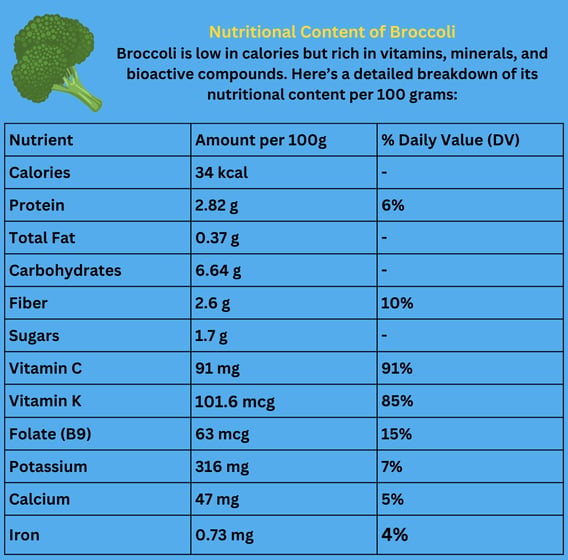

7. Broccoli – The Brain’s Favorite Vegetable
Broccoli is a powerhouse of vitamin K, which supports brain health by promoting cognitive function and memory. It’s also loaded with antioxidants and anti-inflammatory compounds that protect your brain from stress.
How to Use
Steam broccoli as a side dish.
Add chopped broccoli to soups, stir-fries, or salads.
Fun Fact
Just one cup of broccoli provides 100% of your daily recommended intake of vitamin K.
Health Benefits of Broccoli
Antioxidant Properties: Broccoli contains powerful antioxidants like sulforaphane, which can help combat oxidative stress and reduce inflammation in the body.
Cancer Prevention: The bioactive compounds in broccoli, particularly glucosinolates, have been shown to have anti-cancer properties by inhibiting tumor growth.
Heart Health: Regular consumption of broccoli may lower cholesterol levels and improve overall cardiovascular health due to its fiber and antioxidant content.
Bone Health: Rich in Vitamin K and calcium, broccoli supports bone health and may help prevent osteoporosis.
Digestive Health: The high fiber content promotes healthy digestion and regular bowel movements.
Eye Health: Antioxidants like lutein and zeaxanthin found in broccoli may protect against age-related macular degeneration.
8. Green Tea – Energy and Calmness Combined
Why It Works
Green tea contains L-theanine, an amino acid that promotes relaxation without making you drowsy. Paired with caffeine, it improves focus, alertness, and productivity.
How to Use
Swap your morning coffee for a cup of green tea.
Enjoy matcha, a concentrated form of green tea, for an extra brain boost.
Fun Fact
Studies show that L-theanine in green tea enhances alpha brain waves, which are associated with creativity and calm focus.
Action:
🍵 Sip Smarter! Upgrade your focus with premium green tea blends. YOUR'S JAPANESE matcha
Key Nutrients
Caffeine: Provides a mild stimulant effect, enhancing alertness without the jitters associated with coffee.
Polyphenols (Catechins): Particularly epigallocatechin gallate (EGCG), which is known for its antioxidant properties.
Health Benefits of Green Tea
Antioxidant Properties: The catechins in green tea help neutralize free radicals, reducing oxidative stress and inflammation in the body.
Heart Health: Regular consumption may lower cholesterol levels, reduce blood pressure, and improve overall cardiovascular health. Studies show a significant reduction in stroke risk among regular drinkers.
Weight Management: Green tea may boost metabolism and promote fat loss, particularly in the abdominal area, although results can vary.
Cognitive Function: The amino acid L-theanine combined with caffeine may enhance brain function, improving memory and attention.
Cancer Prevention: Some studies suggest that the antioxidants in green tea may lower the risk of certain cancers, although more research is needed for conclusive evidence.
Diabetes Management: Green tea has been linked to improved blood sugar control and increased insulin sensitivity, potentially benefiting those with Type 2 diabetes.
Skin Health: Antioxidants in green tea may improve skin elasticity and reduce signs of aging.
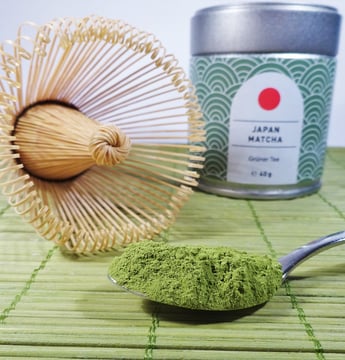

9. Pumpkin Seeds – Tiny Seeds, Big Benefits
Why They Work
Pumpkin seeds are a rich source of magnesium, zinc, iron, and copper, which are essential for brain health. Magnesium improves learning and memory, while zinc and iron help maintain nerve function.
How to Use
Sprinkle pumpkin seeds on salads, oatmeal, or yogurt.
Roast them with a pinch of sea salt for a crunchy snack.
Fun Fact
Pumpkin seeds are one of the best plant-based sources of zinc, a mineral crucial for enhancing memory and focus.
Action Part:
🌱 Boost Your Brain! Grab high-quality pumpkin seeds for a quick, nutrient-packed snack [here](an affiliate link, I will earn some commission through it.)
Scientific Deep Dive
Pumpkin seeds are rich in magnesium, a mineral linked to reduced brain fog and enhanced memory.
Study: A 2020 study in Nutrients found that magnesium supplementation improved short-term and working memory.
Extra Proven Method
Sprinkle roasted pumpkin seeds on soups or salads for a crunchy, nutrient-dense topping.
Procedure for Soaking Pumpkin Seeds
Soaking pumpkin seeds can enhance their digestibility and nutrient absorption by reducing phytic acid, an anti-nutrient that inhibits mineral absorption.
Steps to Soak Pumpkin Seeds
Preparation:
Start with raw pumpkin seeds (preferably hulled).
Rinse the seeds under cool water to remove any pulp or debris.
Soaking Process:
Place the cleaned pumpkin seeds in a bowl.
Cover them with warm water and add salt (about 1 tablespoon of salt for every 4 cups of water).
Allow the seeds to soak for at least 6 hours, but ideally overnight (up to 24 hours).
Drying:
After soaking, drain the seeds and rinse them again.
Spread the soaked seeds on a clean kitchen towel or baking sheet to air dry for a few hours.
Roasting (Optional):
Preheat your oven to about 300°F (150°C).
Toss the dried seeds with olive oil and seasonings of your choice.
Spread them out on a baking sheet in a single layer.
Roast for about 20-30 minutes, stirring every 10 minutes until they are golden brown and crispy.
Soaking enhances their digestibility and nutrient absorption by reducing phytic acid levels, making them more bioavailable. Whether consumed raw or roasted, pumpkin seeds can be a delicious and nutritious addition to your meals or snacks.
10. Turmeric – The Golden Spice of Memory
Why It Works
Turmeric contains curcumin, a compound with powerful anti-inflammatory and antioxidant properties. Curcumin has been shown to boost memory, enhance mood, and even promote the growth of new brain cells.
How to Use
Add turmeric to soups, stews, or scrambled eggs.
Make golden milk (turmeric tea) as a calming brain-boosting drink.
Fun Fact
Curcumin can cross the blood-brain barrier, directly benefiting your brain.
Action Part:
✨ Think Smarter! Add turmeric to your diet with this top-rated Indian[Meghalaya's First BUD powder]turmeric powder.
Turmeric, derived from the rhizomes of the Curcuma longa plant, is a vibrant yellow spice commonly used in cooking and traditional medicine. Its primary active compound, curcumin, is responsible for many of its health benefits. Below is an overview of turmeric's benefits, its applications, and how to incorporate it into your diet effectively.
Health Benefits of Turmeric
Anti-Inflammatory Properties:
Curcumin is known for its potent anti-inflammatory effects, which can help alleviate symptoms associated with conditions like arthritis and other inflammatory diseases. Studies suggest that turmeric can reduce joint pain and improve mobility in arthritis patients.
Antioxidant Effects:
Turmeric has strong antioxidant properties that help neutralize free radicals in the body, reducing oxidative stress and potentially lowering the risk of chronic diseases such as cancer and heart disease.
Heart Health:
Regular consumption of turmeric may improve heart health by enhancing endothelial function, reducing inflammation, and lowering cholesterol levels. Some studies indicate that curcumin can decrease the risk of heart attacks.
Cognitive Function:
Curcumin may help improve memory and cognitive function by increasing levels of brain-derived neurotrophic factor (BDNF), a protein linked to brain health. Some studies suggest potential benefits in managing Alzheimer’s disease.
Digestive Health:
Turmeric can aid digestion and has been used traditionally to treat digestive disorders. Its anti-inflammatory properties may help alleviate symptoms of conditions like irritable bowel syndrome (IBS).
Mood Enhancement:
There is evidence suggesting that curcumin can help alleviate symptoms of depression by increasing serotonin and dopamine levels in the brain, potentially offering a natural alternative or complement to conventional treatments.
Cancer Prevention:
Some studies have shown that curcumin may inhibit cancer cell growth and reduce tumor size in various types of cancer, although more research is needed to confirm these effects in humans.
Weight Management:
Turmeric may support weight loss efforts by improving metabolic health and reducing inflammation related to obesity.
.
How to Incorporate Turmeric into Your Diet
Culinary Uses
Cooking: Add turmeric to curries, soups, stews, rice dishes, or roasted vegetables for flavor and color.
Beverages: Make turmeric tea or "golden milk" by mixing turmeric with warm milk (or a milk alternative), black pepper (to enhance absorption), and sweeteners like honey.
Smoothies: Blend turmeric powder into smoothies for an added health boost.
Supplements
Turmeric supplements are available in various forms (capsules, powders). It’s important to choose supplements that contain piperine (black pepper extract) to enhance curcumin absorption.
Recommended dosages vary; however, studies often use doses ranging from 400 mg to 2 grams of curcumin per day for therapeutic effects.
Preparation Tips
When cooking with turmeric, combining it with fats (like olive oil or coconut oil) can improve curcumin absorption since it is fat-soluble.
For tea: Boil 1-2 teaspoons of turmeric powder in water for 10 minutes, strain, and enjoy warm or cold.
Potential Side Effects
While turmeric is generally safe when consumed in food amounts, high doses or supplements can cause gastrointestinal issues or interact with certain medications (e.g., blood thinners). It’s advisable to consult with a healthcare provider before starting any new supplement regimen, especially if you have existing health conditions or are pregnant .
Conclusion
Incorporating turmeric into your daily diet can offer numerous health benefits due to its anti-inflammatory and antioxidant properties. Whether through cooking or supplements, turmeric provides a flavorful way to enhance your meals while supporting overall health. However, moderation is key, and it’s important to consider potential interactions with medications or underlying health conditions.
Recommended Dosages
While turmeric is considered safe in culinary amounts, higher doses should be approached with caution:
The World Health Organization (WHO) suggests an acceptable daily intake of 1.4 mg per pound (0-3 mg per kilogram) of body weight.
Clinical studies have used doses ranging from 500 mg to 12 grams per day for specific health conditions; however, long-term use at high doses is not well-studied.
For therapeutic purposes like managing osteoarthritis, a common recommendation is 500 mg of curcumin extract taken twice daily.
Scientific Deep Dive
Curcumin in turmeric stimulates BDNF, enhancing the brain’s ability to form new connections.
Study: A 2018 study in The American Journal of Geriatric Psychiatry found that curcumin improved memory and mood in adults over 50.
Extra Proven Method
Add a dash of black pepper to turmeric dishes—it enhances curcumin absorption by 2000%.


Turn Up YOUR Knowledge Into Action
Now that you have this powerful toolkit of brain-boosting foods, it’s time to take action. You and I both know how much potential lies in making these small yet impactful changes to your diet. Let’s fuel our brains and achieve peak productivity, one bite at a time.
